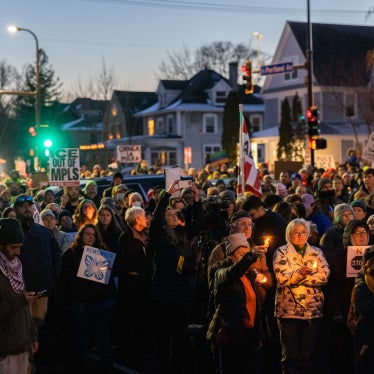(Berlin) – Georgia’s new government needs to rectify the troubling human rights problems it inherited, Human Rights Watch said today in its World Report 2013. In addressing past abuses, the government should avoid politically motivated prosecutions, ensure public scrutiny of its actions, and make the worst abuses a top priority.
The parliamentary elections in October 2012 marked Georgia’s first peaceful transition of power since the country’s independence in 1991. The opposition Georgian Dream coalition, led by the billionaire Bidzina Ivanishvili, defeated President Mikheil Saakashvili’s ruling United National Movement (UNM), gained a majority in parliament, and formed a new government.
“Despite the extremely polarized pre-election environment in Georgia, the country managed to avoid civil unrest and the outgoing government ensured a peaceful transition of power,” said Hugh Williamson, Europe and Central Asia director at Human Rights Watch. “This is commendable, but the new Georgian government still has to prove that it can protect rights while rectifying past abuses.”
In its 665-page report, Human Rights Watch assessed progress on human rights during the past year in more than 90 countries, including an analysis of the aftermath of the Arab Spring. The willingness of governments to respect rights will determine whether the Arab Spring will give birth to genuine democracy or authoritarianism in new clothes, Human Rights Watch said.
In Georgia, while the elections largely met international standards, harassment and intimidation of opposition party activists marred the pre-election environment. Authorities used administrative (misdemeanor) charges to detain activists for minor public order breaches without full due process. Other human rights abuses included torture and ill-treatment in custody, and lack of judicial independence.
Georgia’s new government says it has received over 7,000 complaints of alleged abuses by the former government. The prosecutor’s office has initiated criminal cases against dozens of former officials and close associates, arresting over 20 people.
Foreign diplomats and policymakers have expressed public concern that the criminal cases and arrests amount to political retribution.
With trials pending, the new government should ensure that all detainees have full due process rights and that all trials strictly comply with international fair trial norms, Human Rights Watch said.
The previous government blocked public access to numerous high-profile, politically sensitive trials, giving rise to accusations that the cases were politically motivated.
“It’s crucial for the authorities to allow full public scrutiny of the upcoming trials,” Williamson said. “Public scrutiny, as required by Georgia’s human rights obligations, helps ensure that rights are respected and would be a break with the past.”
Georgia is a party to both the European Convention on Human Rights and the International Covenant on Civil and Political Rights, both of which require countries to guarantee everyone facing a criminal trial a public hearing.
One of the key priorities for the government should be the persisting problem of torture and ill-treatment in prison. In September, local media broadcast a series of video recordings showing graphic images of beating and sexual abuse of prisoners in several penitentiary facilities. A pro-opposition television station broadcast video materials showing Gldani prison officials beating and humiliating newly arrived inmates. Shortly afterward, another television station aired further footage showing prison staff raping inmates.
The authorities should ensure full accountability – including criminal accountability – for those abuses and take measures to prevent it from ever happening again, Human Rights Watch said.
The government should also reform Georgia’s system of administrative detention, Human Rights Watch said. Georgia’s Code of Administrative Offenses sets out misdemeanor sentences of up to 90 days. Although the sentence is equivalent to a criminal penalty, detainees do not have access to full due process rights. In particular, the right to have a lawyer of one’s choosing and the right to an effective defense are often compromised. Lawyers who act for those facing administrative charges sometimes have as little as 10 to 15 minutes to prepare a defense. Defendants are also often not allowed to present evidence or call witnesses in court.
“Parliament should act now to ensure that all those deprived of liberty enjoy their full due process rights and get fair trials regardless of whether charges against them are administrative or criminal,” Williamson said. “Until misdemeanor proceedings offer full due process rights, the authorities should refrain from jailing people accused of misdemeanors.”
The judiciary’s lack of independence is a serious problem. Monitoring research by the Georgian Young Lawyers’ Association in 2012 showed that the Tbilisi City Court judges granted all motions filed by the prosecution regarding the admissibility of evidence, while denying all defense motions that the prosecution did not support.
Many defendants accept plea bargains because they do not trust the judiciary, which convicts in more than 98 percent of cases. As a result, over 87 percent of cases ended in plea bargains in which defendants agreed to pay damages to avoid prison. Once the plea bargain deal was struck, the case materials were closed and never made accessible to the public. Trials were also closed for video, photo, and audio recordings.
The government should consider establishing a mechanism such as a specialized Criminal Review Unit to deal with the past miscarriage of justice, Human Rights Watch said. Such a body should be allowed to review possible miscarriages of justice that are alleged to have occurred in criminal courts and refer to an appeal court cases in which it considers that fair trial norms were violated.
“Georgia’s new government is under pressure to deliver human rights improvements fast,” Williamson said. “But in the process it shouldn’t make shortcuts at the expense of rights.”






